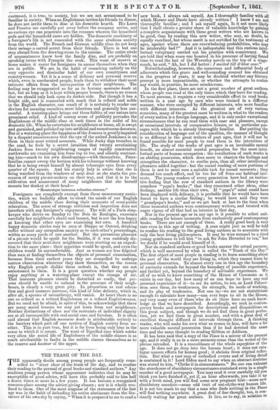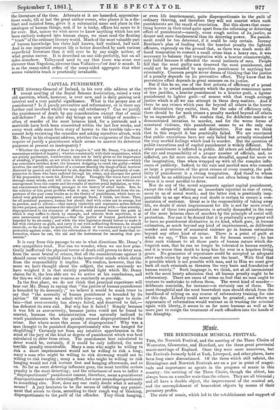THE TRASH OF THE DAY.
THE apparently docile among young people are frequently coun- selled to " steer clear of the trash of the day, and to confine their reading to the perusal of good books and standard authors." Any studious young person whose appearance indicates that he may be susceptible of good advice, will have this probably said to him half a dozen times or more in a few years. It has become a recognized common-place among the advice-giving classes; nor is it wholly con- fined to them. One of the most singular of the statesmen of the last age was in the habit of defending his entire abstinence from the lite- rature of his own day by saying, "When it is proposed to me to read a new book, I always ask myself, Am I thoroughly familiar with an which Horace and Dante have already written ? I know I am not
thoroughly familiar ; and I ask myself again, Is it not more lady
that I shall obtain a greater share of valuable knowledge by gaining a complete acquaintance with these great writers who are known to
be good, than by reading this new writer, who may, no doubt, be equally excellent, but whose merit is not certified by the testimony of ages, against whom there are overwhelming probabilities, who may
be intolerably bad P" And it is indisputable that this curious intel- lectual voluptuary carried out his practice with consistency. We are told that when some one boasted in hispresence of having found time to read the last of the Waverley novels on the top of a stage_ coach, he said, " Ah, but I did better : I waited till it blew over.'
Notwithstanding, however, the numerous and influential body of adherents which this grave and well-sounding counsel has obtained in the progress of years it may be doubted whether any literary precept is more impracticable, or whether the attempts to realize any would, in practice, be more mischievous. In the first place, there are not a great number of great authors whom people can read at the only times which they have for reading. To most persons, it requires a very considerable effort to read books written in a past age by men who were trained in a different manner, who were occupied by different interests, who were familiar with different interests. As the greatest are of very various countries, many. of the greatest must be written in what to the readers of every nation is a foreign language, and it is only under exceptional circumstances that he can read them with ease and pleasure, except at occasional intervals of comparative leisure, or in particular pas- sages with which he is already thoroughly familiar. But patting the consideration of language out of the question, the manner of thought is so different in the great writers of past ages, that it will not be found possible for most people to read them in the interstices of life. The study of the works of past ages is an invaluable mental benefit, an almost essential mental preparation for the most intel- lectual parts of human occupation: the recollection of such works is an abiding possession, which does more to chasten the feelings and strengthen the character, to soothe pain, than all other intellectual pleasures added together : but the casual reading of mere portions of them is not to most men a suitable task for casual moments : they demand too much effort, and lie too far off from our habitual inte- rests. The young readers of every generation have had an instinc- tive feeling that the row of standard authors in the library were somehow "papa's books;" that they concerned other ideas, other feelings, another life than their own. If "papa's" mind could have been displayed with delicacy, it is probable that he would have been found to have a similar feeling; he would have said they were " grandpapa's books," and so we get back at last to the time when those immortal authors were contemporary writers, and treated with eager vigour of all that had an interest in that day. Nor in the present age or in any age is it possible to select suit- able readi g for leisure moments from exclusively good contemporary books. There are not enough of them. A really good book is very rare even in this age of writing. A. man might just as well be told to confine his reading to the good living authors as to associate with only the best living philosophers. It may be wise counsel to a tired young gentleman to tell him "to ask Sir John Herschel to tea," but we doubt if he would avail himself of it.
Nor do standard authors or good books answer the actual purpose, which is well answered by what is called the "Trash of the Day." The first object of most people in reading is to learn something about the part of the world they are living in, which they cannot learn by personal observation. To almost every one in this age the boundary of curiosity extends far beyond the boundary. of possible experience, and further yet, beyond the boundary of advisable experience. We all of us wish to know something of the House of Commons as it exists in our day, but how many of us can hope to have any real personal experience of it—to see its action, to see, as Lord Palmer- ston sees them, its weaknesses, its strength, its mode of working, and its play of tendencies. Not one in—we arc not statisticians enough to calculate how many—can ever hope to sit in the House, and very many even of those who do sit there have no such know- ledge as that we have described. Accordingly, we seek in contem- porary books and newspapers for descriptions and disquisitions on this great subject, and though we do not find them in great perfec- tion, yet we find them in great number, and with a great deal of excellent thought diffused at intervals through them. A thinking reader, who will make his own what so comes to him, will have a far more valuable mental possession than if he had devoted the same time and the same thought. to reading Gibbon or Addison. It has been said that a copy of the Times is a mirror of the present age, and it really is so in a more accurate sense than the writer of the phrase intended. It is a resemblance of the whole supeificies of the age. It does not go deep into the human heart ; it does not cata- logue unseen efforts for human good; it shrinks from original reflec- tion. But what a vast map of embodied events and of living detail is contained in it ! Lord Eldon used to say when an abstract doctrine was stated to him, "Clothe it in circumstances." No one can exhaust the storehouse of elucidatory circumstances contained even in a single number of a good newspaper. You' may read it over carefully till you think you have finished it, yet if, an hour afterwards, you take it up with a fresh mind, you will find some new pregnant hint—some new elucidatory anecdote—some odd trait of out-of;the-wayhuman We. It is not too much to say that a man who finds nothing in the Tines will find nothing anywhere. A great deal of fine thought, too, is con- stantly waiting for great authors. It lies, so to say, in solution in the literature of the time. Attempts at it are hazarded, approxima- tions made, till at last the great author comes, who places it in a dis- tinct and isolated form, gives it a substantial name and place in the catalogue of human things, and, if he is lucky, affixes his name to it for ever. But, unless we wish never to know anything which has not been entirely reduced into human shape, we must read the floating " trash" of the ordinary literary world. Much of the most valuable part of human knowledge lies there half known, half realized, half said. And in one important respect life is better described by such various superficial literature than it will ever be by any single author, of what genius soever. It is described on one side perfectly, but on all sides somehow. Talleyrand used to say that there was some one cleverer than Napoleon, cleverer than Voltaire—c'esi tout le monde. It is as the many-sided reflex of the many-sided aggregate that what seems valueless trash is practically invaluable.































 Previous page
Previous page